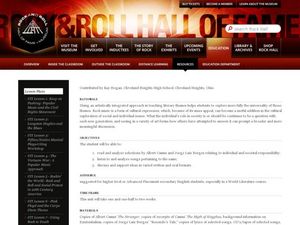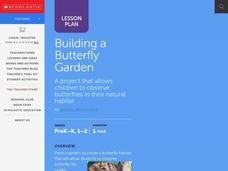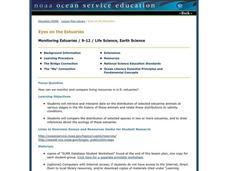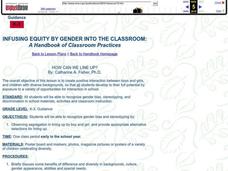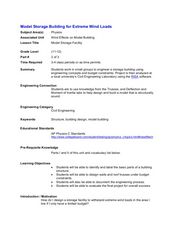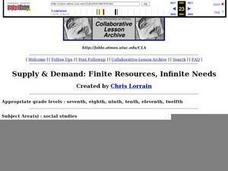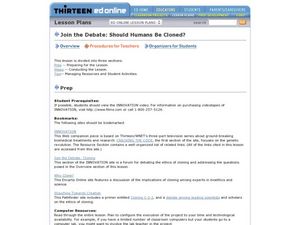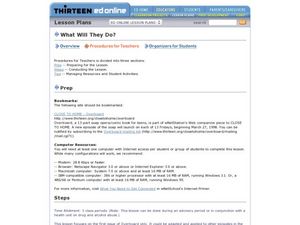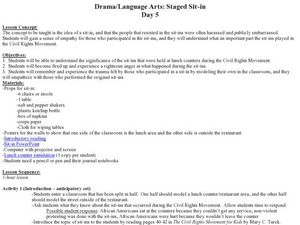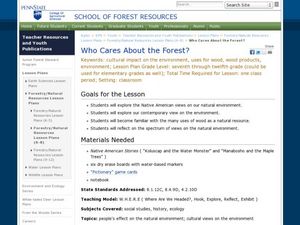Curated OER
Memorials and Meaning
Students explore the Civil War. In this Civil War lesson, students collaborate to research the war. They examine Matthew Brady photographs that inspire them to create a memorial to honor those who served in the Civil War.
Curated OER
Chewin' in the Chesapeake
Students examine a web page on food webs and select a habitat to research. In this research lesson students identify the organisms found in the food web and present their findings to the class.
Curated OER
All About HIV and AIDS
Learners use the internet to research the causes, effects and how AIDS is transmitted from person to person. In groups, they discover why women are more suseptiable to the disease. To end the lesson, they are introduced to the various...
Curated OER
Individual vs. Social Responsibility: From Camus to the Cure
Students explore the individual's role in society. In this social responsibility lesson, students analyze Camus's The Stranger and The Myth of Sisyphus as well as Borges's "Rosendo's Tale." Students compare the themes of the pieces to...
Curated OER
Building a Butterfly Garden
Students plant a garden which will become the habitat for butterflies as they go through their life cycle. In this life cycle lesson, students grow plants that attract butterflies and feed caterpillars in order to observe the...
Curated OER
Eyes on the Estuaries
Students study estuaries and compare several ones in the U.S. In this estuary lesson students interpret data and compare the distribution of different species.
Curated OER
See That Sound?
Students study sonar and will explain the concept of it and its major components. In this design lesson students build a low-cost sonar system.
Curated OER
How Can We Line Up?
Students discuss diversity. In this culture lesson plan, students talk about stereotypes and respecting other cultures, genders, and backgrounds. They come up with suggestions on how to line up in a way other than "boy/girl".
Curated OER
Social Studies: Civil Rights Gets Stronger
Students investigate segregation in the United States. For this American Civil Rights lesson, students read Oh Freedom and discuss the implications of segregation. Students then view images from the time period and take notes...
Curated OER
Model Storage Facility
Learners design a storage facility that can withstand extreme wind loads. In this physics lesson, students decide how to build their facility considering budget constraints. They evaluate their design and present it to class.
Curated OER
Supply & Demand: Finite Resources, Infinite Needs
Students discuss conflict resolution strategies they use in real life. They listen to "Getting to Yes" about principled negotiation. They negotiate the distribution of goodies on a table according to rules and time constraints. They...
Curated OER
Agriculture: Oklahoma's Legacy
Students continue exploring the history of Oklahoma Agriculture in this lesson. They trace several historical migrations to the state of Oklahoma. They simulate the customs and conditions of a chosen migration. Vocabulary and resource...
Curated OER
Should Humans Be Cloned?
Students explore links on the Internet to collect facts about cloning then prepare an essay on their findings. In this research writing instructional activity students examine how to include their opinions on what they have found in...
Curated OER
CLOSE TO HOME - Overboard
Students read a comic about a teen drug overdose that leads to death. In this drug awareness lesson, students role play characters in the story that react to the death of their friend due to drug use in an online forum. Students evaluate...
Curated OER
At Home on the Range
Eighth graders explore rangeland uses in Utah. In this Utah rangeland lesson, 8th graders read background information on the purposes of rangeland. Students work in groups to create their own ranges using peat. Students discover grazing...
Curated OER
Staged Sit-in
Students watch a PowerPoint presentation that includes pictures of a sit-in and participate in a simulated sit-in. In this sit-in lesson, students perform a sit-in skit based on The Civil Rights Movement for Kids by Mary C....
Curated OER
Who Cares About the Forest?
Students explore the natural environment and people's views, in particular the Native Americans. For this environment lesson students discover the many uses of wood as it pertains to our natural resources.
Curated OER
Selecting Trees for Urban Environments
Students consider the best place to plant a tree. In this environment lesson plan, students identify urban locations that are compatible with particular tree types. Students decide what trees would go where and why they would survive.
Curated OER
Exploring the Smithsonian
Students explore the Smithsonian Institute. In this technology and history lesson, students work in pairs to complete a worksheet by researching questions using the Smithsonian Institute website.
Curated OER
Scientific Notation
Students explore the concept of expressing numbers in scientific notation. In this scientific notation lesson, students understand the importance of using scientific notation by finding real world examples where scientific notation is...
Curated OER
Who Am I?
Learners explore study different mathematicians. For this mathematician lesson, students research twelve mathematicians. Learners question one another to guess who their mathematician is. Students create a timeline of big events in math.
Curated OER
The Great Grizzly
Students view video on grizzly bear. In this research lesson students create a list of questions about grizzlies and create a life size poster of an adult grizzly.
Curated OER
Rain Forest Rally
Eighth graders study tropical and temperate rainforests. For this rainforest lesson students complete a lab activity using the Internet.
Curated OER
Visualizing the Invisible
Young scholars create animations of black holes using a computer and also materials that are scanned and used in their animation. In this black hole activity students explore how to use animation and create an example of a Black...





